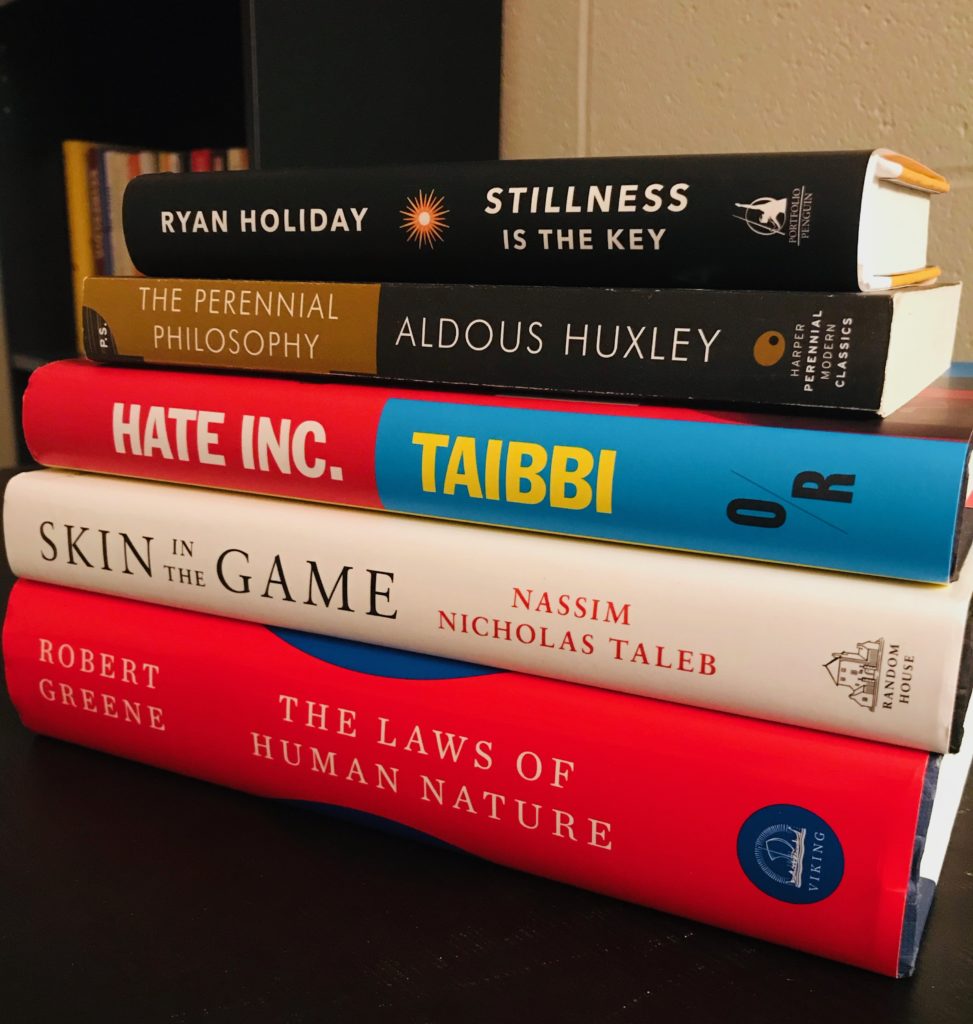
No need for a verbose introduction here. There’s enough of that from recipe bloggers and English majors. Here are the five best books I read in 2019.
5. Hate, Inc.: Why Today’s Media Makes Us Despise One Another by Matt Taibbi
Most people assume that the news exists to educate or at least inform them. But as Taibbi points out, the news is a consumer product designed to keep you angry, confused, and tuned in for as many hours as possible so networks can rack up advertising revenue.
Taibbi, a Rolling Stone journalist, is as informative as Noam Chomsky and as entertaining as the New Yorker. And before you pull the liberal bias card, notice that Rachel Maddow occupies just as much of the cover as Sean Hannity. Translation: nobody is safe from Taibbi’s critique.
Favorite quote:
Mass media makes the act of watching more important than words. It can take rage and defiance, and in a snap turn it into obedience and submission. Listening in anger to your favorite political program, you will act like a person who is shaking a fist at power, when in fact you’ve been neutralized as an independent threat, reduced to a prop in a show.
4. Stillness Is the Key by Ryan Holiday
I make it a rule for myself to read anything this guy writes. That rule has yet to disappoint.
While most authors, influencers, and public figures are peddling “life hacks” to help you do more, Holiday offers a different, time-tested strategy: slow down. Drawing from the lives of monks, politicians, and athletes, this book is a plea to hit pause and a guide to achieving the headspace that’s so rare in our get-it-yesterday culture.
(If you read Hate Inc. and Stillness, you’ll never want to watch the news again. Seriously.)
Favorite quote:
If you believe there is ever some point where you will feel like you’ve ‘made it,’ when you’ll finally be good, you are in for an unpleasant surprise. Or worse, a sort of Sisyphean torture where just as that feeling appears to be within reach, the goal is moved just a little bit farther up the mountain.
3. Skin in the Game: Hidden Asymmetries in Daily Life by Nassim Nicholas Taleb
Should you trust a surgeon who doesn’t look like a surgeon? How do corporations led by Ivy League grads go bankrupt? Why do we prefer complex solutions over simple ones?
These are the type of questions Taleb wrestles with. Bouncing between politics, finance, personal responsibility, and academia, Taleb argues that our society is plagued by people who talk without ever putting their neck on the line. In other words, they don’t have skin in the game. If you want to minimize your risk of failure and embarrassment, Taleb says, follow the Silver Rule: Do not do unto others as you would not have them do unto you.
Favorite quote:
If your private life conflicts with your intellectual opinion, it cancels your intellectual ideas, not your private life.
2. The Perennial Philosophy by Aldous Huxley
After 16 years of Catholic school, you start to feel like that way is the only way. Obviously this isn’t the case, which is the central theme of this book. Huxley draws on dozens of religions to highlight how they all converge at a central point. Belief, faith, whatever you want to call it is more akin to art than science–there are plural truths. Regardless of where you’re at on the spectrum, this book is a monumentally important step to escaping your bubble and becoming culturally literate.
Favorite quote:
To suppose that people can be saved by studying and giving assent to formulas is like supposing that one can get to Timbuctoo by poring over a map of Africa.
1. The Laws of Human Nature by Robert Greene
From the man who wrote the second-most requested book in prison libraries comes a treatise on the unconscious and conscious biases that define the human condition. Greene’s thesis isn’t exactly uplifting: We are deeply flawed creatures that frequently act against our own self interest. However, his vivid storytelling and brutally honest analyses give you a sense of control over your thoughts and behaviors as opposed to the millions of people who are slaves to themselves.
This book clocks in at 600+ pages, but it’s worth its weight in gold.
Favorite quote:
We see people not as they are, but as they appear to us.
If you want more book recommendations like these, I send one out each month via my newsletter. If you’re new to the list, you’ll get some bonus material as well.